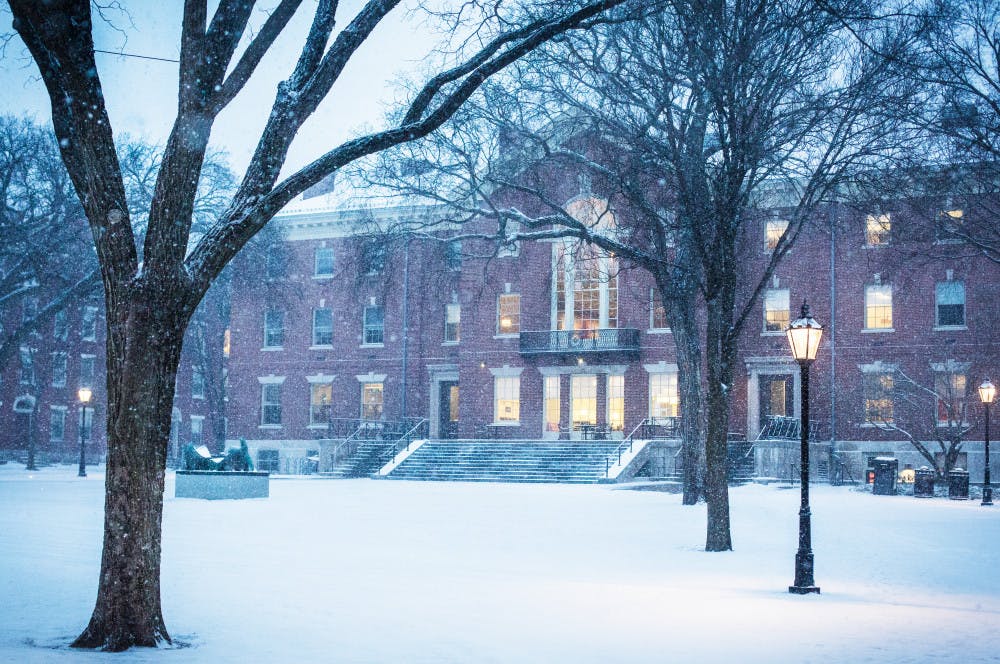Dean of the College Maud Mandel and Dean of the Faculty Kevin McLaughlin P’12 will present an initial proposal for a winter term at Tuesday’s faculty meeting, Mandel said.
The proposed Winter Session will feature “a handful of intense, creative experimental courses in January” that span three weeks and cover the standard 48-contact-hour requirement of semester courses, Mandel said.
A working group composed of faculty members, staff members and students, co-chaired by Mandel and McLaughlin, formed last January to discuss the idea of a January term, which the group agreed to call Winter Session.
The group explored the feasibility and demand for Winter Session in “a preliminary discussion about a larger discussion,” said Ian Kenyon GS, a member of the committee and a Herald opinions columnist.
The group met “about every two weeks semester and pursued the various parts of the president’s charge, which were asking us to consider the pros and cons of a winter session,” Mandel said.
These meetings culminated in a set of recommendations encouraging the pursuit of a winter term, which Mandel and McLaughlin presented to President Christina Paxson P’19 and former Provost Vicki Colvin in May.
Due to the transition in the provost position over the summer, “it was really President Paxson and Provost (Richard Locke P’17) who got back to us over the summer,” Mandel said. The two “thought it would be a good idea to take the recommendations of the committee to faculty and campus this semester,” she added.
Mandel and McLaughlin are currently visiting various faculty and student governance committees to discuss the proposal, Mandel said, adding that so far, it has been met with support.
The two administrators will present the proposal to the Undergraduate Council of Students’ Academic and Administrative Affairs committee at a meeting Thursday that will be open to the public, said Sazzy Gourley ’16, UCS president.
Financial aid availability and calendar consistency surfaced as two key elements that the group made sure to include in its proposal.
“We agreed that the thing we were striving for was inclusion across the student body,” Kenyon said. According to the proposal, students on financial aid would have full access to their aid packages for Winter Session tuition.
In addition to student inclusion, maintaining the University’s schedule emerged as a clear priority for the committee. “The idea of moving the calendar was, for many people, a deal-breaker,” Mandel said.
The proposal fits Winter Session into the existing structure of winter break, not disrupting the date of graduation or other large University events.
An additional characteristic of the proposed Winter Session is that it would allow faculty members to offer new, innovative courses.
“It will allow for intensive and highly focused courses, like studio classes in art and music or deep training in the usage of some sort of particular scientific or engineering instrument or method,” Mandel said.
The structure would allow professors to pursue pedagogical innovation and course development, Mandel said.
Wendy Edwards, chair of the visual arts department and committee member, said she has taught high-immersion courses and seen “how much people grow and develop when they are given that opportunity.”
When students can take one class at a time, it gives them an opportunity to expand their academic horizons, she said. “You could be a biology major, but you decide to take a studio class, and you don’t have to worry about anything else,” she added.
A Winter Session would be “a great way to try out something new, and it’s also a different learning environment,” said Ria Mirchandani ’15, the only undergraduate on the committee.
“I left Brown wishing I had had more time there, so I think Winter Session would have been a great way to get that out of my system,” Mirchandani said.
Though the proposal includes international and online courses as well as courses for graduate students, those would likely be part of a “phase two” implementation of Winter Session, Mandel said.
One concern regarding the potential launch of on-campus courses as part of Winter Session regards facilities logistics.
“Having students on campus during Winter Session is difficult, and you’re opening up a can of worms in terms of other costs,” Kenyon said, adding that dining services, residence halls and various student services would need to be maintained over the break.
“We are exploring options for dining and housing for a potential Winter Session, and I will be having discussions with students regarding any potential opportunities,” Richard Bova, senior associate dean of residential life, wrote in an email to The Herald.
Mandel said she hopes the faculty will vote on the proposal in December. A finalized version of the proposal will be made public before the vote, she said.
If the faculty votes in favor of the proposal, a Winter Session pilot phase would begin in either January 2017 or 2018, Mandel said. “It’s going to be quite small at the beginning, maybe seven or eight courses limited to 15 or 20 students,” she added.





